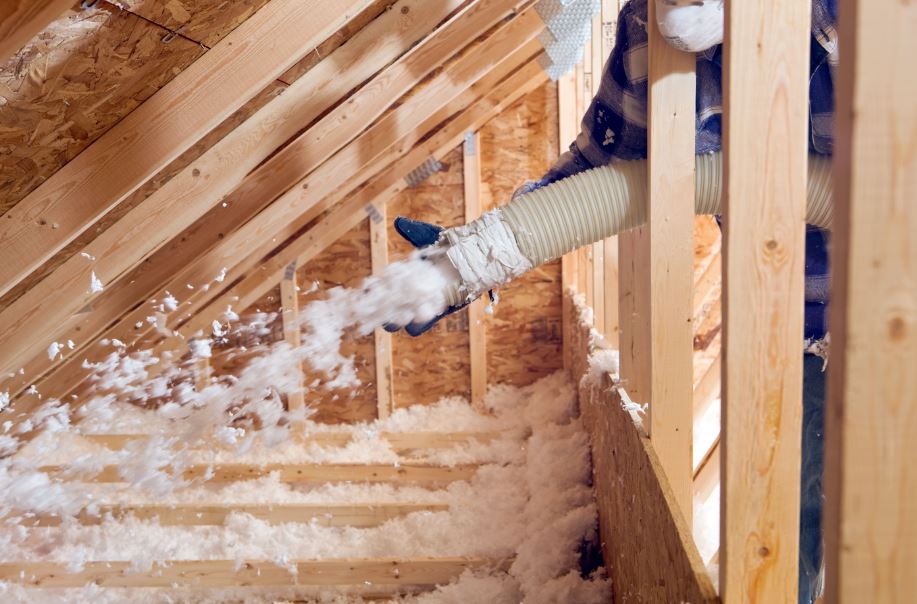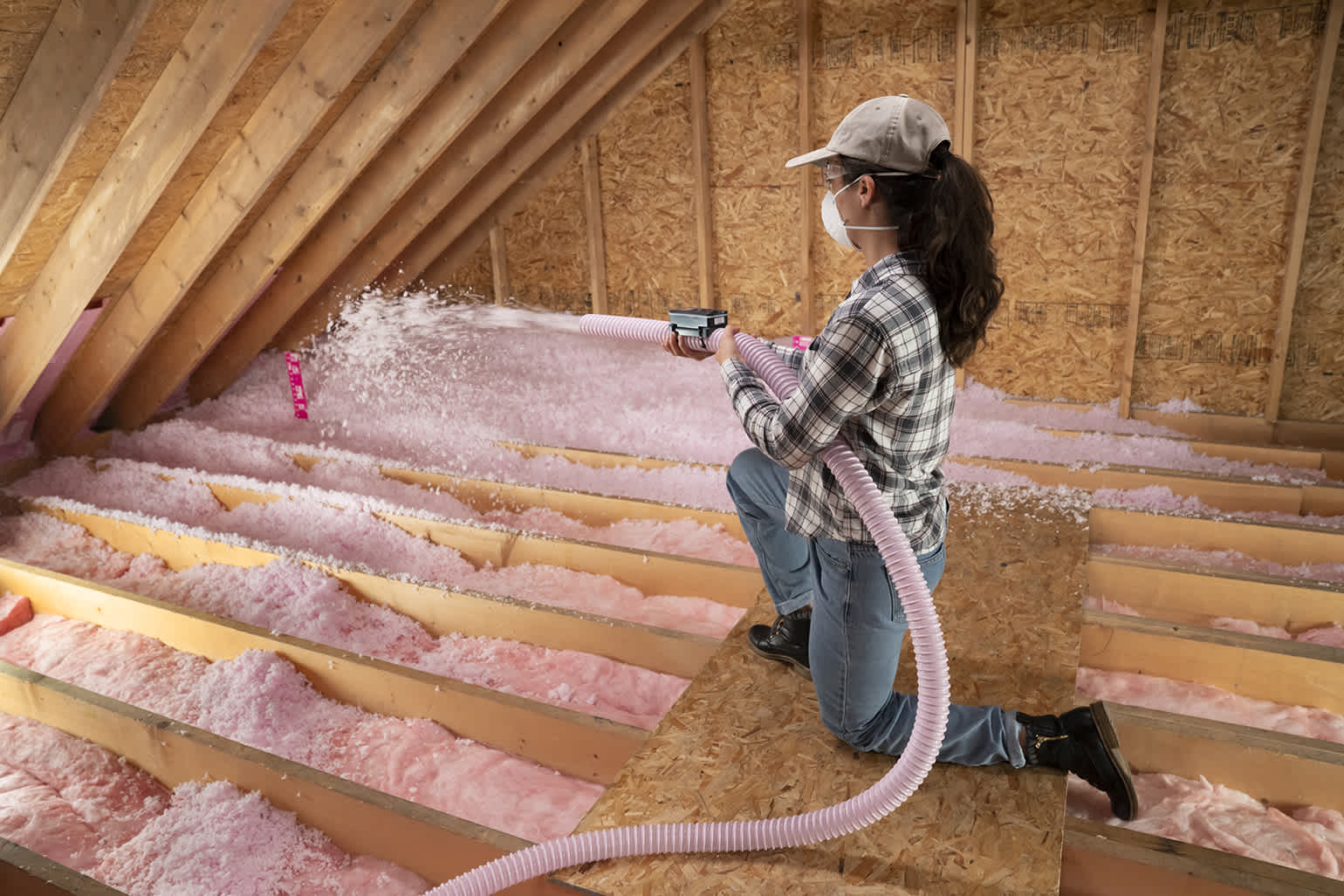Attic Insulation DFW: What You Need to Know Prior To Updating Your Insulation
Attic Insulation DFW: What You Need to Know Prior To Updating Your Insulation
Blog Article
Discover the Different Kinds of Attic Insulation and Their Distinct Benefits for Your Home's Power Effectiveness

Fiberglass Insulation
Fiberglass insulation is among the most commonly made use of materials for attic room insulation because of its excellent thermal efficiency and cost-effectiveness. Made up of small glass fibers, this material efficiently catches air, producing a shielding barrier that assists maintain constant indoor temperature levels. Its high R-value per inch makes it especially effective at resisting heat transfer, which is vital for energy preservation in homes.
Installment of fiberglass insulation is fairly straightforward, usually readily available in batts or loose-fill kinds, accommodating numerous attic arrangements. Furthermore, it is resistant and non-combustible to wetness, minimizing the danger of mold and mildew advancement. This resilience adds to its longevity, making fiberglass a feasible long-term financial investment for home owners.
In addition, fiberglass insulation is typically produced from recycled materials, which improves its eco-friendliness. The product can also add to soundproofing, minimizing noise transfer between spaces. While it is important to put on protective equipment throughout setup to avoid irritability from the fibers, the total advantages of fiberglass insulation, consisting of power savings and environmental factors to consider, make it a prominent selection for boosting attic performance and promoting a comfy living environment.
Spray Foam Insulation
Spray foam insulation is a highly effective option for attic room insulation, known for its exceptional air sealing and thermal performance. This cutting-edge insulation material is made up of a blend of isocyanate and polyol resin, which, when combined, broadens rapidly to fill gaps and cavities in the attic room area. Its capacity to comply with different surface areas ensures a continuous obstacle against air leaks, substantially reducing heat loss during colder months and heat gain during warmer periods.
Among the key benefits of spray foam insulation is its high R-value per inch, which indicates it supplies outstanding thermal resistance in a reasonably thin application. This is particularly beneficial in attics where space is often restricted. Additionally, spray foam can aid minimize wetness accumulation, reducing the risk of mold and mildew and mold development, which can be destructive to both the framework and indoor air high quality.
While the first cost of spray foam insulation may be greater than standard choices, its long-term energy savings, paired with enhanced comfort and enhanced home worth, make it a rewarding investment for property owners seeking boosted power efficiency. Attic Insulation DFW. In general, spray foam insulation attracts attention as an efficient option for maximizing attic insulation
Cellulose Insulation

Cellulose insulation is a preferred choice for attic insulation, largely made up of recycled paper items treated with fire resistants. This eco friendly alternative is known for its exceptional thermal efficiency, effectively minimizing warm transfer in both summer season and winter season months. The thick structure of cellulose permits it to fill up gaps and gaps in attic areas, providing a smooth barrier versus air leakages.
Among the considerable benefits of cellulose insulation is its ability to stand up to mold and insects, owing to the fire retardant therapies utilized throughout production. Furthermore, it boasts a high R-value per inch, which translates into superior power effectiveness. House owners can expect reduced heating and air conditioning costs as an outcome of boosted insulation.
Installment is usually completed through blowing loose cellulose into the desired location, permitting a fast and reliable process. This technique also reduces interruption why not find out more to the existing structure. Cellulose insulation has a fairly low environmental effect, as its production process utilizes recycled materials, adding to sustainable building techniques.
Rock Woollen Insulation
Among the different alternatives for attic room insulation, rock woollen, also called mineral woollen, stands apart because of its excellent thermal and acoustic efficiency. Made from all-natural or recycled products, rock woollen is produced by melting rock and spinning it into fibers, leading to a product that provides excellent insulation properties.
One of the substantial advantages of rock wool insulation is its high R-value, which suggests its effectiveness in resisting warm circulation. This characteristic not only enhances energy efficiency but additionally adds to keeping a comfy indoor temperature level year-round. In addition, rock woollen is inherently fire-resistant, making it a safer option for homes as it can stand up to high temperatures without melting or releasing hazardous fumes.
Additionally, rock wool insulation succeeds in soundproofing abilities, properly reducing noise transmission between rooms and from outside resources. Overall, rock wool insulation offers a comprehensive service for improving energy effectiveness, safety, and convenience in household settings.
Glowing Barrier Insulation
Glowing barrier insulation offers as an efficient option for minimizing warm transfer in attic rooms, my explanation especially in warmer environments. This kind of insulation works by mirroring induction heat far from living rooms, thus lowering the amount of heat that goes into a home during warm climate - Attic Insulation DFW. Commonly composed of a highly reflective product, such as aluminum foil, radiant barriers are mounted in attic rooms, encountering the roofing, where they can intercept inbound heat from the sunlight
The primary advantage of page radiant obstacle insulation is its ability to lower air conditioning costs. By mirroring warm as opposed to absorbing it, glowing barriers can help maintain an extra steady indoor temperature, reducing the work on cooling systems. This effectiveness translates into reduced energy expenses and raised convenience for homeowners.
Along with energy savings, glowing obstacles can additionally add to improved interior air high quality. By minimizing warm accumulation, they help minimize humidity levels, which can prevent mold and mildew development and boost overall air circulation. When installed appropriately, glowing barrier insulation can be an invaluable enhancement to any energy-efficient home, making it a worthy factor to consider for homeowners wanting to boost their attic insulation technique.
Final Thought
In verdict, recognizing the numerous kinds of attic insulation-- fiberglass, spray foam, cellulose, rock wool, and radiant obstacles-- makes it possible for homeowners to make enlightened choices relating to energy efficiency. Each insulation kind presents distinct benefits, such as exceptional thermal resistance, dampness administration, and audio depletion. By picking the appropriate insulation material, considerable reductions in energy prices can be accomplished, in addition to improvements in interior convenience. Inevitably, the best selection adds to a much more sustainable living atmosphere and advertises overall energy conservation.

In final thought, recognizing the various kinds of attic insulation-- fiberglass, spray foam, cellulose, rock woollen, and radiant obstacles-- makes it possible for house owners to make educated decisions concerning energy performance.
Report this page